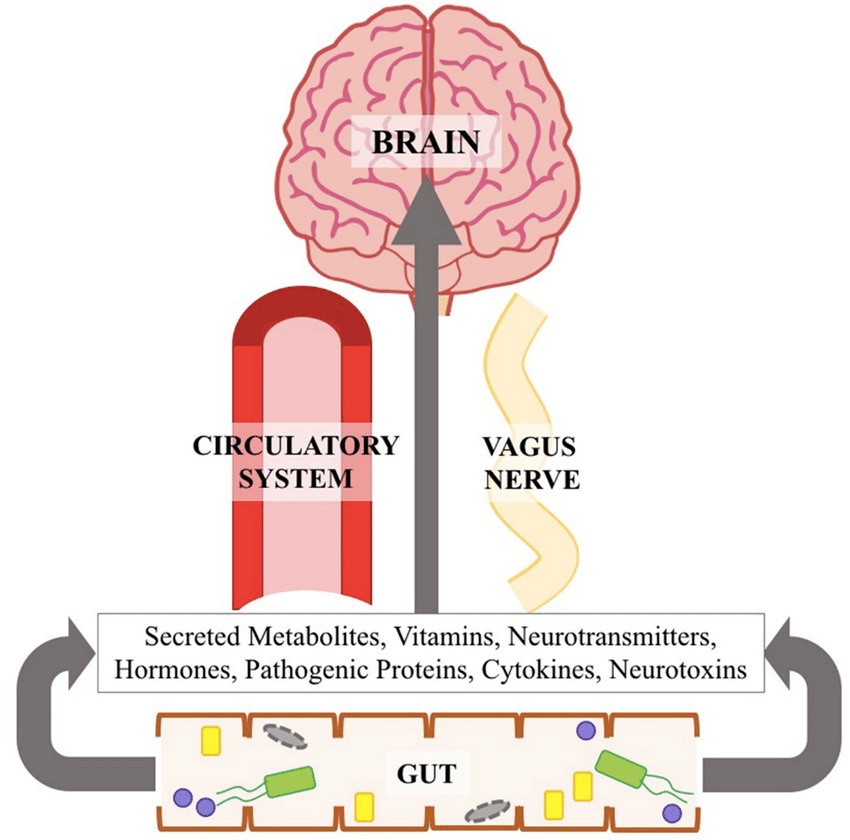Akshaya Ganji, Adlai E. Stevenson High School (UnknownNow)
Source: 1
Introduction
Past research has indicated that gut bacteria has the ability to influence cognitive and emotional abilities2. On the other hand, such bacteria have also been shown to influence vulnerability to certain brain diseases. For instance, Chlamydia pneumoniae, Helicobacter pylori, and Cutibacterium acnes have been found to inhabit the brains of ND patients3. Moreover, patients with Parkinson’s diseases have a substance called synuclein, which is created by gut bacteria and has the ability to travel via nerves to the brain.
This is done because nerves are connected to your brain and gut. Therefore, as substances curated by bacteria in the gut enter your blood, it could send signals to your brain by stimulating immune system cells.
However, recognizing the roles of bacteria will allow us to change the microbes to improve our health4.
Moreover, pro-and prebiotics have been found to improve the function of the central nervous system (CNS) and play a significant role in the prevention and treatment of brain disorders because of their ability to modulate the gut-brain axis5. This paper will specifically focus on possible ways pro-and prebiotics can be used as adjacent therapies to regulate certain neurodegenerative diseases.
Gut microbiota and brain communications
The gut microbiota communicate with each other through neural, immune and endocrine signals. Indirect communication pathways could be Microbial metabolites (e.g. short-chain fatty acids, exopolysaccharides, lipopolysaccharides) crossing the intestinal epithelium6.
Microbial metabolites can activate G-protein coupled receptors (GPCRs) in the ENS and central nervous system, regulating metabolism and inflammation. Toll-like receptors (TLRs) are activated by microbial components like exopolysaccharides and lipopolysaccharides, triggering immune and neurohormonal responses.
These receptors can therefore regulate T cell homeostasis, and may protect against neuroinflammatory disorders. Moreover, Microbial activation of TLR2 strengthens ENS integrity, promotes neurotrophic factors, increases neuron/glial cell numbers, and supports neuron survival7.
Impacts of pro-and prebiotics on the CNS
Probiotics and prebiotics help maintain an optimal balance of gut microbiota, strengthening these communication pathways.
Strong evidence suggests that gut microbiota play a role in bidirectional interactions between the gut and the CNS by regulating brain chemistry and influencing neuro-endocrine systems associated with stress response, anxiety and memory function. Moreover, the relationship between CNS on microbiota composition can be restored by the use of probiotics and possibly by diet.
In addition, the active presence of prebiotics could bring upon balance and increase the number of probiotics in the colon has the same therapeutic effect on mental disorders8.
They have the ability to increase neurotransmitter production such as Tryptophan and serotonin, affecting mood and combined usage has shown improved symptoms for stress, memory and depression. These effects appear to be strain-specific, urging the role of certain probiotic strains as novel adjuvant strategy9.
Impacts of pro-and prebiotics on certain neurological disorders
Sleep disturbance is a major risk factor for neurological disorders such as stroke, seizure, etc10. However, Probiotics like Lactobacillus casei Shirota and Lactobacillus gasseri CP2305 have been shown to improve sleep quality and reduce sleep disorders in clinical trials.Meta-analyses indicate probiotic supplements can effectively improve perceived sleep quality11.
Moreover, Alzheimer’s disease (AD) most often involves a massive buildup of amyloid-beta plaques and tau protein tangles in the brain, leading to neurodegeneration12; however, altered gut microbiome composition has been observed in AD patients compared to healthy controls. Nonetheless, further studies and research is needed to elucidate the specific effects of probiotics on AD13.
Conclusion and future perspectives
To conclude, Prebiotics, probiotics, and synbiotics have shown promising effects for treating:
- Anxiety disorders
- Depression
- Stress and stress-related conditions
- Sleep disorders and disrupted circadian rhythms
- Alzheimer’s disease and cognitive impairment
However, further evidence and research in large clinical trials across diverse populations is much needed to recommend psychobiotic treatments and to better understand the specific effects of different psychobiotic formulations on mental health conditions. Nonetheless, combining psychobiotics with standard treatments seems to be a promising area for future research.
References
1. Website. https://www.researchgate.net/figure/Communication-between-the-gut-microbiota-and-the-brain-43-reused-with-permission_fig1_335399206.
4. Komaroff, A. L. What’s the connection between the gut and brain health? Harvard Health https://www.health.harvard.edu/staying-healthy/whats-the-connection-between-the-gut-and-brain-health (2022).
10. [No title]. https://www.pennmedicine.org/for-patients-and-visitors/find-a-program-or-service/neurology/sleep-conditions#:~:text=In%20addition%2C%20obstructive%20sleep%20apnea,impairment%20and%20poor%20seizure%20control.

Leave a comment